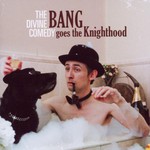Bang Goes the Knighthood
Studio Album by The Divine Comedy released in 2010Bang Goes the Knighthood review
The Divine Comedy’s fans will surely not be disappointed
The Irish group The Divine Comedy was formed back in 1989, its line-up has changed several times since then, the only permanent member being the front man Neil Hannon. The band’s music is called chamber pop, yet, if one traces the way the character of its creations was changing from one album to another it is clear that the musicians chose a different approach to work quite often. At first Hannon take to make grotesque comic lyrics and put it in the frames of decorative orchestra arrangements, then turned to very deep and serious philosophic reflections. It is interesting that despite the high critical acclaim The Divine Comedy’s albums never enjoyed any remarkable commercial success, the best period for the band was in the mid-late 1990s. Nevertheless, this year the band releases its tenth album Bang Goes The Knighthood, the first release in four years after the 2006’s Victory For The Comic Muse 2006, and The Divine Comedy’s fans will surely not be disappointed.
Oppositions meet on Bang Goes The Knighthood
The album Bang Goes The Knighthood is a mixture of melancholy, pathos, silliness, love, dancing, vulnerability, eccentricity and simplicity. Unexpected philosophic metaphors alternate with superficial clichés and flat jokes in the lyrics, whereas harmony and mess reign in the instruments one after another. The album opens with the lengthiest track Down In The Street Below starting with a beautiful slow tune and turning into a rhythmic circus performance in music and the vocals remain sadly measured throughout the song. Contagious piano chords refine the anthem The Complete Banker with an amazing guitar solo at the end, whereas not a very serious number Neapolitan Girl pleases with a rich orchestra accompaniment and an airy tune. The title track is filled with a sullen, tragic and magic atmosphere, Hannon plays the role of an artful story-teller here, while the ballad Have You Ever Been In Love is definitely one of the album’s highlights; romantic, soft with fiddles it presents a great example of retro jazz meeting ironic indie-pop. Another lively song with absurd lyrics Assume The Perpendicular conquers with optimistic tubes and sax, and a joyful piano and melodious guitars sound again on The Lost Art Of Conversation. Neil demonstrates his soulful and powerful vocals on a very beautiful ballad When A Man Cries rendering an endless sadness, and the record closer is the most life-affirming number I Like, a childish love confession devoid of any ambiguity.
A bit insane atmosphere and amazingly nice songs
It is not always clear what principles guide the audience in choosing its idols and in case of The Divine Comedy one should think of it even twice. Its hit for all time, National Express, is far from the only successful song in the band’s history, yet, most of them for some reason remain noticed only by the most faithful fans. There are a number of songs on The Divine Comedy’s record that can easily become hits, and on the whole Bang Goes The Knighthood is rather integral album despite that the melodies are complicated and hard to memorize after just one listening and that the lyrics are a bit superficial at times. It is not the first time that The Divine Comedy manages to unite some opposite things creating a bit insane atmosphere and amazingly nice songs. Some of the themes on Bang Goes The Knighthood are quite curious and they can be hardly ever come across in music creations. It is worth while hoping that The Divine Comedy’s tenth album can change the situation to the better, and the world will finally value it as it deserves.

